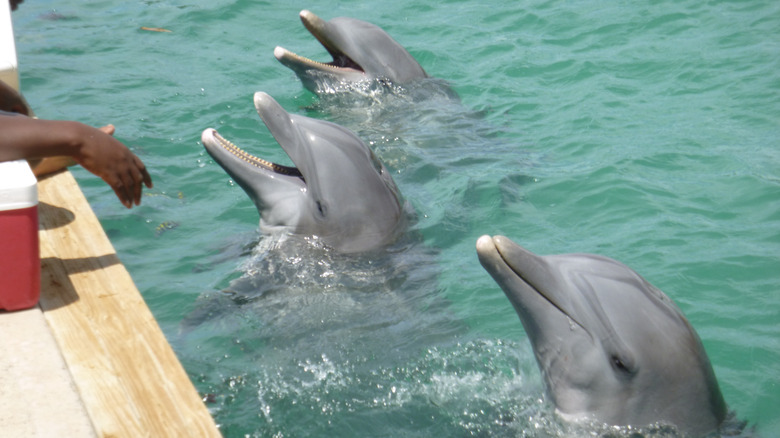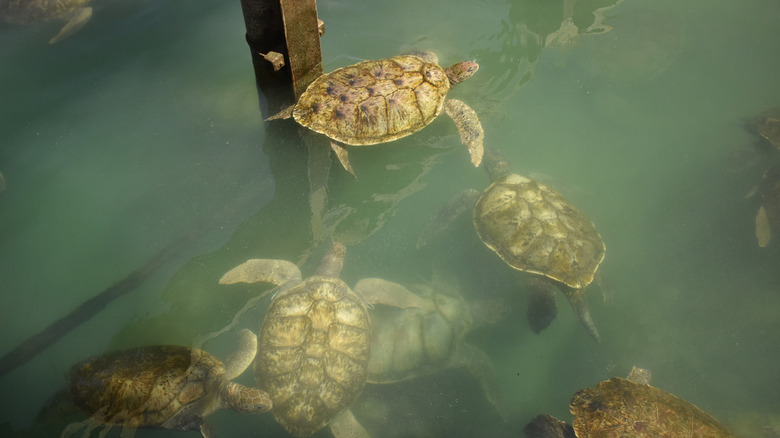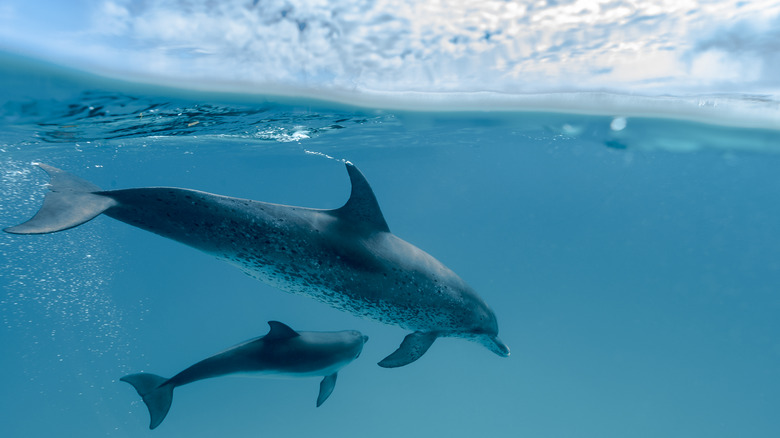The Popular And Harmful Type Of Tourist Attraction To Avoid On A Trip To The Caribbean
Tourism is the major industry in the Caribbean and has been vital to the economy of the region for a very long time. People come from all over the world to relax on white sand beaches, dip into warm turquoise waters, and see the incredible native wildlife. Unfortunately, some unethical tourist traps take advantage of visitors' desire to get closer to their favorite creatures, like dolphins and sea turtles, by advertising unique experiences with them. Tourists may leave these attractions with photos of themselves expressing their deep love for these creatures and memories that last a lifetime — but the animals suffer behind the scenes.
These deceptive attractions are everywhere, preying on people's love of animals. To avoid having your money go towards exploitation, abuse, and even death of the creatures that you traveled across an ocean to see, always do your research on anywhere claiming to offer experiences with animals. When in doubt, try visiting some of the Caribbean's mesmerizing national parks and seeing these creatures in their natural habitats. While it might sound fun to get to touch and hold animals, nothing beats the thrill of seeing them living free and knowing that you have done everything you can to keep them safe and wild.
Abusive animal experiences in the Caribbean
When planning a trip to the Caribbean, animal lovers have to sort through a mountain of incredible wildlife viewing opportunities. Unfortunately, some of the most common animal experiences promoted to tourists are not what they appear to be. The most egregious example may be the Cayman Turtle Center, where excited visitors are invited to hold baby turtles and swim alongside adults. While it describes itself as a conservation experience, visitors on Tripadvisor have claimed to see animals trapped in tiny cages and swimming in filthy water. In the wild, these creatures would swim thousands of miles. Their fears were seemingly confirmed when in 2014, more than 1,000 turtles in the care of the center died from a disease outbreak. Worst of all, this center breeds endangered green sea turtles not only for tourists to hold but to be killed for meat, as reported by National Geographic.
It's not just sea turtles that are exploited for the benefit of tourists. Dolphins are kept in tiny pens by companies like Dolphin Discovery. Visitors have reported seeing trainers lift baby dolphins out of the water, flip them upside down, toss them around, and hug them. Adult dolphins are forced to do tricks to entertain crowds. Dolphin tourism like this is a massive industry that not only harms individual dolphins but has serious repercussions for dolphin populations in the wild. Hundreds of wild dolphins are captured every year, and while many are killed for meat, others are sold to tourist attractions like the ones that are rampant in the Caribbean.
Ethical ways to enjoy wildlife in the Caribbean
Tourist attractions where captive animals are made to interact with or perform for tourists are extremely abusive to animals, but that doesn't mean you can't have a wonderful experience seeing wildlife in the Caribbean! With a little planning, you can have the experience of a lifetime without harming the animals you love. The simplest option is to go to places where the animals are naturally and see for yourself how they live in the wild. For instance, consider heading to Spotts Beach in the Cayman Islands, an underrated Caribbean beach where you can swim near wild sea turtles. You could even go snorkeling — just make sure you know how to snorkel around coral reefs safely!
If you dream of seeing a dolphin, check if the dolphin-watching tour that caught your eye is a part of NOAA's Dolphin SMART program, or abides by its regulations (including staying 50 yards from the animals and not driving boats through dolphin pods, which risks harming them.) While you might be enticed by the opportunity to swim alongside these incredible creatures, getting into a tiny pen where they are trapped won't be as incredible an experience as seeing a wild dolphin leap from the crystal clear blue Caribbean Sea.


